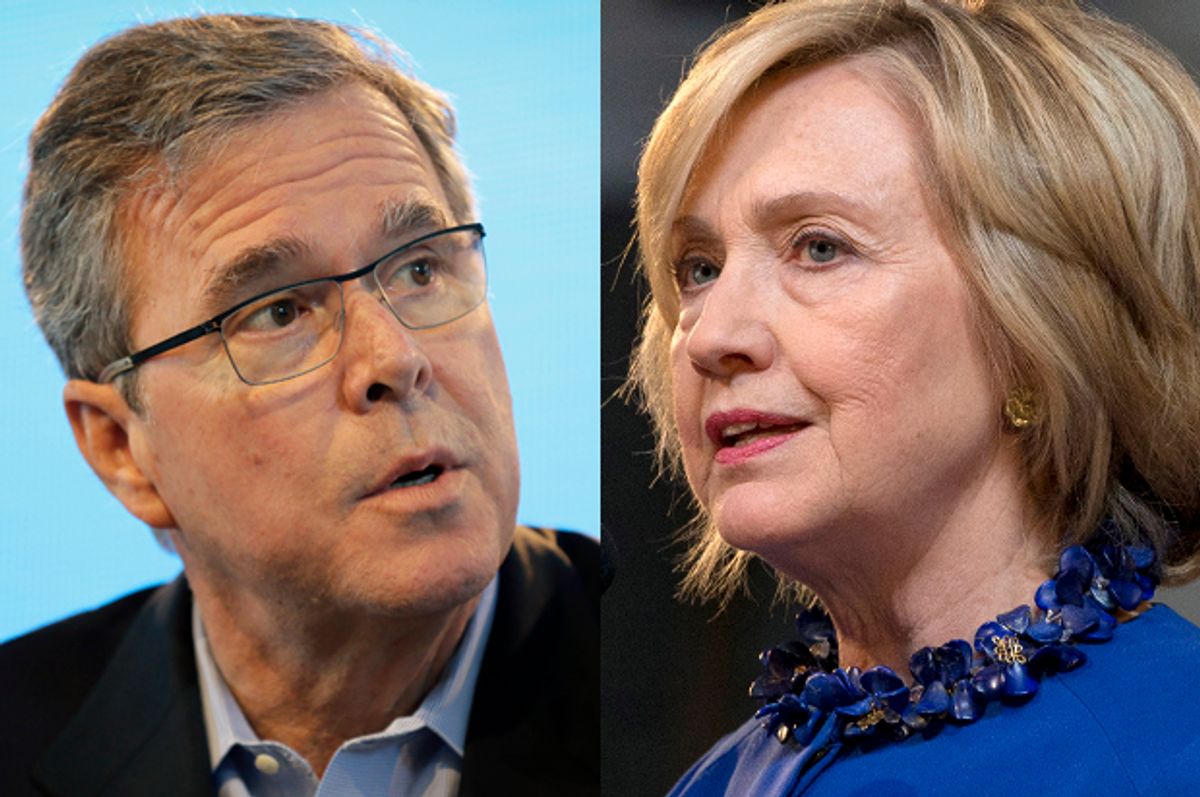Without ever uttering his name, Hillary Clinton used her appearance at today's gathering of the National Urban League in Ft. Lauderdale, Florida, to launch a rhetorical attack on former Florida Gov. Jeb Bush's record with African Americans.
Bush was one of only two Republicans who bothered showing up to the annual conference of the historic civil rights organization today, but his willingness to actually act on the so-called outreach his party has too often only promised was no shield from the harsh criticisms Clinton lobbed his way.
Pointedly referring to the name of Bush's official super PAC, Right to Rise, Clinton knocked Bush's appeal to the African American crowd as merely pandering. “Too often we see a mismatch between what some candidates say in venues like this and what they actually do when they are elected,” she said. “People can’t rise if they can’t afford healthcare, they can’t rise if the minimum wage is too low to live on," she declared.
"They can’t rise if their governor makes it harder for them to get a college education," Clinton continued, targeting her prospective 2016 opponent's record as governor of Florida more particularly.
Bush eliminated affirmative action at Florida's public universities and colleges by executive action, a move he frequently boasts about on the campaign trail.
Finally, she argued, "you can’t seriously talk about the right to rise and support laws that deny the right to vote."
As governor, Bush cut early voting hours and opposed an appeal to restore voting rights to felons who've served their time (before ultimately accepting it.) Most infamously, in 2001 Bush was cited by a U.S. Civil Rights Commission for the “unjust removal of disproportionate numbers of African-American voters” from the voter rolls.
Bush never took the opportunity to engage Clinton's earlier remarks or return the fire on stage. For his part, once Bush took the podium he regurgitated the same stale and tired big government digs he employs at rallies with Iowa Republican voters in front of a crowd of mostly African American activists. “For a half century, this nation has pursued a war on poverty and massive government programs, funded with trillions of taxpayer dollars," Bush argued.
He skimmed over the issues of criminal justice reform and police brutality, mentioning that trust in institutions was at all-time low and imploring politicians, police officers and community leaders to repair the damage. Bush made no mention of his support for mandatory minimum sentencing as governor of Florida when he said that, "in this country, we shouldn't be writing people off, denying them a second chance at a life of meaning."
He did find room, however, to give slight praise to President Obama before quickly lecturing black men to be better fathers: "When President Obama says that, quote, 'for too long we’ve been blind to the way past injustices continue to shape the present,' he is speaking the truth. But we should be just as candid about our failures in addressing the injustices of today."
Although Bush claimed to have gone "through a period of what some might call 'self-reflection' but I referred to it as 'listening and learning,'" it was Clinton, who during her time at the podium said what it appeared Bush was unwilling to say: "Race still plays a significant role in determining who gets ahead in America and who gets left behind. And yes, while that's partly a legacy of discrimination that stretches back to the start of our nation, it is also because of discrimination that is still ongoing."
"I'm planning to be president, and anybody who seeks that office has a responsibility to say it, and more than that, to grapple with the systemic inequities," she said. "I want you to know I see it and I hear you, and the racial disparities you work hard every day to overcome go against everything I believe in and everything I want to help America achieve."

Shares